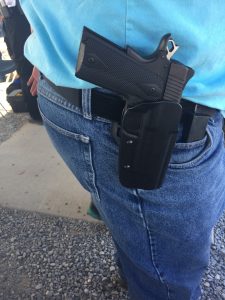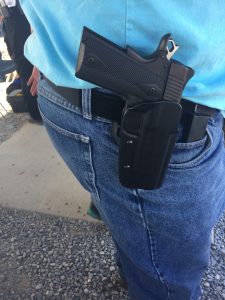
According to the dictionary, concealed carry or carrying a concealed weapon (CCW), is the practice of carrying a weapon (such as a handgun) in public in a concealed manner, either on one’s person or in close proximity.
Ostensibly a right guaranteed under the Second Amendment, carrying firearms can be much more complicated depending upon where you live. Many states now make it difficult for law abiding citizens to own a gun which puts them at a distinct disadvantage when dealing with criminals who don’t care about permits, training or background checks.
Remember, not all weapons that fall under CCW laws are lethal. For example, in Florida, carrying pepper spray in more than a specified volume (2 oz.) of chemical requires a CCW permit, whereas anyone may legally carry a smaller, so-called, “self-defense chemical spray” device hidden on their person without a CCW permit.
The states give different terms for licenses or permits to carry a concealed firearm, such as a Concealed Handgun License/Permit (CHL/CHP), Concealed Carry Weapons (CCW), Concealed (Defensive/Deadly) Weapon Permit/License (CDWL/CWP/CWL), Concealed Carry Permit/License (CCP/CCL), License To Carry (Firearms) (LTC/LTCF), Carry of Concealed Deadly Weapon license (CCDW), Concealed Pistol License (CPL), etc.
There’s a great set of maps over on usacarry.com that show how the rules differ by state.
Constitutional Carry/Unrestricted/Permitless Carry
An unrestricted jurisdiction is one in which a permit is not required to carry a concealed handgun. This is sometimes called Constitutional carry. The phrase “constitutional carry” means that someone can carry a handgun without a license or permit. The term was derived from the Second Amendment to the U.S. Constitution, which gives citizens the right to bear arms.
- Alaska
- Arizona
- Arkansas
- Idaho (residents only)
- Kansas
- Kentucky
- Maine
- Mississippi
- Missouri
- New Hampshire
- North Dakota (residents only; concealed carry only)
- Oklahoma (2019)
- South Dakota (2019)
- Vermont
- West Virginia
- Wyoming (residents only)
Among U.S. states, Alaska, Arizona, Kansas, Maine, and Vermont are Fully Unrestricted, and allow those who are not prohibited from owning a firearm to carry a concealed firearm in any place not deemed off-limits by law without a permit. Wyoming only extends permitless carry to residents of the state; non-residents must still have a permit issued by their home state to legally carry concealed in Wyoming. Maine also allows permitless carry. A similar bill allowing permitless carry in New Hampshire was passed by both chambers of the New Hampshire Legislature in 2015, before ultimately being blocked by a veto from Governor Maggie Hassan.These states also allow the open carry of a handgun without a permit.
Vermont does not have any provision for issue of concealed-carry licenses, as none has ever been necessary. As such, Vermont residents wishing to carry handguns in other states must acquire a license from a state which is valid in their destination. A popular choice is Florida’s concealed handgun permit, which is valid for nonresident holders in 28 other states.
Alaska, Arizona, Kansas, Maine, and Wyoming all previously had concealed-carry license requirements prior to adoption of unrestricted carry laws, and continue to issue licenses on a “shall-issue” basis for the purposes of inter-state reciprocity (allowing residents of the state to travel to other states with a concealed weapon, abiding by that state’s law).
The states of Arkansas, Idaho, Montana, New Hampshire, New Mexico, and Oklahoma are Partially Unrestricted states. Specifically, Montana and Idaho both currently allow concealed carry without a permit in places outside of any incorporated municipality. Arkansas allows the carrying of firearms openly displayed, but still requires a permit to carry concealed. New Mexico and New Hampshire laws allow an individual to conceal carry an unloaded handgun without a permit. New Mexico further allows one to carry a loaded handgun either openly or concealed while traveling in a vehicle, including motorcycles, recreational vehicles (RVs), bicycles or while riding a horse. Oklahoma allows residents of permitless carry states to carry openly or concealed without a permit, provided such individuals have a valid ID from their home state. All of the aforementioned states grant permits on a Shall-Issue basis for modes of concealed carry that require a permit.
Shall Issue means that as long as you pass basic requirements set out by state law, the issuing authority (county sheriff, police department, etc.) shall issue you a permit. May Issue means that you must pass basic requirements and the issuing authority may issue you a permit.
Shall Issue:
States that are Shall Issue will issue any private citizen a concealed weapons permit as long as they meet all requirements.
A Shall-Issue jurisdiction is one that requires a license to carry a concealed handgun, but where the granting of such licenses is subject only to meeting determinate criteria laid out in the law; the granting authority has no discretion in the awarding of the licenses, and there is no requirement of the applicant to demonstrate “good cause”. The laws in a Shall-Issue jurisdiction typically state that a granting authority shall issue a license if the criteria are met, as opposed to laws in which the authority may issue a license at their discretion.
Shall Issue to Residents Only:Alabama, Colorado, Georgia, Louisiana, Michigan, Montana, Nebraska, New Mexico, Guam.
Shall Issue to Residents and Non-Residents:
Florida, Illinois, Indiana, Iowa, Minnesota, Nevada, North Carolina, Ohio, Oregon, Pennsylvania, Rhode Island, South Carolina, Tennessee, Texas, Utah, Virginia, Washington, Wisconsin, Puerto Rico, District of Columbia.
May Issue:
States that are May Issue have the authority to take judgment on whether or not they want to issue a concealed weapons permit to a private citizen even after they have met all requirements. A May-Issue jurisdiction is one that requires a permit to carry a concealed handgun, and where the granting of such permits is partially at the discretion of local authorities (frequently the sheriff’s department or police), with a few states consolidating this discretionary power under state-level law enforcement.
The law typically states that a granting authority “may issue” a permit if various criteria are met, or that the permit applicant must have “good cause” (or similar) to carry a concealed weapon.
May Issue to Residents and Non-Residents:
Arizona, Arkansas, Idaho, Kansas, Kentucky, Maine, Mississippi, Missouri, New Hampshire, North Dakota, South Dakota
Alaska, Oklahoma, West Virginia, Wyoming
There is no federal law addressing the issuance of concealed-carry permits. All fifty states have passed laws allowing qualified individuals to carry certain concealed firearms in public, either without a permit or after obtaining a permit from a designated government authority at the state and/or local level.
The Federal Gun Free School Zones Act limits where an unlicensed person may carry; carry of a weapon, openly or concealed, within 1,000 feet (300 m) of a school zone is prohibited, with exceptions granted in the federal law to holders of valid State-issued weapons permits (State laws may reassert the illegality of school zone carry by license holders), and under LEOSA to current and honorably retired law enforcement officers (regardless of permit, usually trumping State law).
When in contact with an officer, some states require you to inform that officer that you are carrying a handgun. For detailed information on individual states’ permitting policies, see Gun laws in the United States by state.
Reciprocity
In addition, there’s the issue of reciprocity if you live near a state line or travel a lot. Because there’s a difference between concealed carry recognition and reciprocity. Some states have reciprocity agreements with other states which means each state honors the other state’s concealed carry permit.
Here’s an example of concealed carry reciprocity between two states: State A accepts State B’s concealed carry permit holders to carry in State A and State B accepts State A’s concealed carry permitholders to carry in State B.
There are also some cases where State A will accept State C’s concealed carry permit holders but State C WILL NOT accept State A’s concealed carry permit holders. This is NOT reciprocity.
Training requirements
Some states require concealed carry applicants to certify their proficiency with a firearm through some type of training or instruction. Certain training courses developed by the National Rifle Association that combine classroom and live-fire instruction typically meet most state training requirements. Some states recognize prior military or police service as meeting training requirements.
Classroom instruction would typically include firearm mechanics and terminology, cleaning and maintenance of a firearm, concealed carry legislation and limitations, liability issues, carry methods and safety, home defense, methods for managing and defusing confrontational situations, and practice of gun handling techniques without firing the weapon. Most required CCW training courses devote a considerable amount of time to liability issues.
Depending on the state, a practical component during which the attendee shoots the weapon for the purpose of demonstrating safety and proficiency, may be required. During range instruction, applicants would typically learn and demonstrate safe handling and operation of a firearm and accurate shooting from common self-defense distances. Some states require a certain proficiency to receive a passing grade, whereas other states (e.g., Florida) technically require only a single-shot be fired to demonstrate handgun handling proficiency.
CCW training courses are typically completed in a single day and are good for a set period, the exact duration varying by state. Some states require re-training, sometimes in a shorter, simpler format, for each renewal.
A few states, e.g., South Carolina, recognize the safety and use-of-force training given to military personnel as acceptable in lieu of formal civilian training certification. Such states will ask for a military ID (South Carolina) for active persons or DD214 for honorably discharged persons. These few states will commonly request a copy of the applicant’s BTR (Basic Training Record) proving an up-to-date pistol qualification. Active and retired law enforcement officers are generally exempt from qualification requirements, due to a federal statute permitting retired law enforcement officers to carry concealed weapons in the United States.
Virginia recognizes eight specific training options to prove competency in handgun handling, ranging from DD214 for honorably discharged military veterans, to certification from law enforcement training, to firearms training conducted by a state or NRA certified firearms instructor including electronic, video, or on-line courses. While any one of the eight listed options will be considered adequate proof, individual circuit courts may recognize other training options. Virginia is currently governed and run by Democrats who have made gun control a priority and the counties are busily organizing to become “sanctuaries” for gun owners. Expect a show down soon as the Governor has already mentioned the possible use of the Virginia National Guard.
